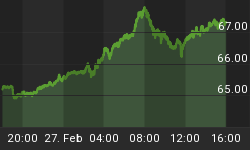The following is part of Pivotal Events that was published for our subscribers June 30, 2016.
Signs of The Times
A natural rebound in commodities and precious metals has excited supply/demand analysts.
"Gold Price: USD 65,000/OZ in Five Years?"
- Bullion Star, June 16.
"Michael Rothman, whom many consider to be the best energy analyst on Wall Street, predicts oil prices will surge above $85 by the end of the year."
- CNBC, June 17.
"We've Defeated the Shale Revolution Claims OPEC"
- The Times, June 19.
"Make no mistake about it. Britain's vote to leave the EU is the most damaging blow ever inflicted upon the liberal democratic international order."
- Financial Times, June 24.
Perspective
For some years, we have described Brussels as "Moscow on the Maastricht, without the privilege of state murder".
Clearly, the above FT comment is not written by an impartial journalist, but by a polemicist for authoritarian government. Had the EU been based upon each country declaring free trade the union would have worked. But as with NAFTA, an intrusive bureaucracy became involved and it became a "managed" trade agreement, with the cheat of currency depreciation.
In 1989, the year ordinary "volk" ended Communism in Eastern Europe, most Western economists were admiring the wonders of the Soviet economy. There was little real information about the Communist economy, but the economists knew that with a full-command economy it had to be good. Best-selling economics textbooks were full of it.
The "volk" knew otherwise and shut down authoritarian central planners. Venezuelans may soon have do something similar.
The EU is not a "liberal democratic international order", but a big step towards order imposed by one-world-government. In England, the main issue is the supremacy of parliament. And it is worth throwing in - the sovereignty of the individual.
It has been ironical that after defeating Europe's dreadful experiments in authoritarian government, England should surrender to yet another utopian delusion.
Contrary to the Financial Times, Brexit is an important step to restoring freedoms that go with democracy.
Stock Markets
Has the Brexit hit cleared the financial markets of all the problems? A big German bank fell by 20% just on Friday. Or should it be considered as a warning of developing financial distress?
Tuesday's Special noted that the rally and the reversal satisfied our technical objectives. The reversal was at an appropriate level at the appropriate moving average and within the appropriate season.
In looking at the broad market, the NYA set its big high at 11255 in May last year. The failure was taking out the 65-Week ma in August. This was equivalent to the failure at the end of 2007.
Out of the panic into January, we recognized the second big rally in the bear. It would likely be limited by the 65-Week ma, which had halted the November rebound. The line was exceeded at 10648 two weeks ago. That was the high for the year and we noted that taking out the May low of 10119 would be a failure.
Monday's low was 9918, which took out the 50-Day at the 10400 level and the 200-Day at 10112. This is important.
The rebound is approaching the 50-Day at 10391. There is considerable resistance at this level.
As sectors leading market turns, Tuesday's piece covered the financials, which were robust on the way down and not so robust on the way up.
Transports have been doing a yeoman's job in leading the train of events. Particularly in May last year when it signaled the end of the bull. Then again in June in not confirming the robust rally in the S&P.
TRAN did much the same as the financials. Up to the 65-Week ma at 8114 in March. Then testing the ma at 7951 at the first of June. The Brexit low was 7029, which took out the May low of 7470.
At 7425 now, there is considerable resistance at the 7600 level.
Financials and Transports remain negative.
The European STOXX is interesting.
The plunge was down to 2678 on Monday, which compares to 2672 reached in the troubles of February. The chart follows and shows that the STOXX accomplished the second rally in its bear. In this case, as in 2002, it made it to the 40-Week ema and has failed.
Still elevated by the most reckless central bankers in history, financial markets and the US economy remain precarious. Europe has become even more precarious.
Euro Stoxx 50

- The decline in 2008 was rapid.
- The second rally of the 2002 bear reached the 40-Week exponential moving average and failed.
- Much the same attends this, the second rally in Europe's current bear.
- On the Weekly RSI, the plunge did not get oversold.
Listen to the Bob Hoye Podcast every Friday afternoon at TalkDigitalNetwork.com















